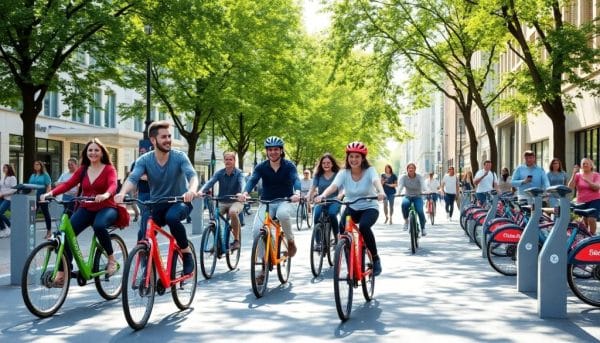The UK has witnessed a remarkable transformation in urban transportation with the introduction of dockless bike hire schemes. These innovations have significantly enhanced urban mobility since their inception, particularly in cities like London and Hackney. This article explores the implications of this trend, including benefits, challenges, and innovative solutions that are shaping the future of urban travel.
Enhancing urban mobility through dockless bike schemes
The rise of dockless bike hire in the UK is transforming urban transportation by providing an eco-friendly and flexible alternative to traditional commuting methods. These bikes offer residents and visitors an opportunity to navigate cities efficiently, promoting a more sustainable lifestyle.
Accessibility is one of the most significant advantages of these schemes. With no need for docking stations, users can pick up and drop off bikes at various locations, making cycling more appealing. Moreover, it reduces the time spent searching for parking, which is a common issue in urban environments.
Cities are increasingly integrating dockless bike hire with public transport, allowing for seamless transitions between different modes of travel. This integration is essential for reducing emissions and managing congestion in urban areas.
Furthermore, initiatives led by local councils aim to increase active travel promotion, encouraging residents to incorporate cycling into their daily routines. Such efforts are crucial in fostering a culture of sustainable travel solutions.
What are the benefits of dockless bike hire in urban areas?
The benefits of dockless bike schemes for urban mobility are extensive. Firstly, they contribute significantly to reducing traffic congestion. By offering an alternative to car travel, these bikes help alleviate pressure on busy roads, particularly during peak hours.
- Environmental Benefits: Dockless bike hire promotes sustainable travel, reducing carbon footprints and improving air quality.
- Cost-Effective: Using dockless bikes can be cheaper than public transport or car travel, making it an attractive option for budget-conscious individuals.
- Health Benefits: Cycling is a form of physical exercise, which contributes positively to public health by encouraging active lifestyles.
- Economic Growth: Increased cycling can boost local economies by attracting tourists and encouraging spending in local businesses.
Moreover, the rise of dockless bike hire in the UK has also fostered competition among service providers. Companies such as Lime have expanded their services, leading to improved offerings for consumers.
The convenience of these bikes, combined with the growing awareness of their benefits, has made them a popular choice among urban dwellers.
How are cities managing dockless bike parking?
Managing dockless bike parking is crucial to ensure a seamless integration of these bikes into urban environments. Cities are adopting various strategies to tackle this challenge effectively.
One innovative solution is the implementation of Mobility Corrals, designated areas where users can park their bikes. These corrals minimize pavement hazards and ensure that bikes are parked in a manner that does not obstruct pedestrian pathways.
Regulatory frameworks are also being established to guide the operation of dockless bike hire schemes. Local authorities are working closely with providers to set rules regarding parking, usage, and maintenance of the bikes.
Additionally, cities are investing in improved bicycle parking infrastructure. This involves creating more bike lanes and enhancing existing pathways to encourage safe riding. Cities like Wandsworth have embraced these changes to promote a more bicycle-friendly atmosphere.
Incorporating technology, many dockless bike hire companies are utilizing GPS tracking to monitor bike usage and parking patterns. This data helps cities identify high-demand areas and adjust parking solutions accordingly.
What challenges are associated with dockless bike hire?
Despite the numerous advantages, several challenges are faced by dockless bike hire in the UK. One of the primary concerns is regulatory uncertainty. As the popularity of these bikes increases, cities must navigate the complexities of implementing effective regulations without stifling innovation.
Another significant challenge is the potential for pavement hazards. Inadequate parking management can lead to bikes being left in inappropriate places, obstructing pedestrian pathways and creating safety issues. Addressing this concern requires collaboration between local authorities and service providers.
Additionally, public perception plays a pivotal role in the success of dockless bike schemes. Some individuals may view these bikes as a nuisance, leading to calls for stricter regulations. Public awareness campaigns highlighting the benefits of cycling and the role of dockless bikes can help mitigate these perceptions.
Finally, the issue of bike maintenance and safety cannot be overlooked. As usage increases, so does the wear and tear on bikes. Companies must ensure that their fleets are regularly maintained to avoid accidents and promote user confidence.
What innovations are improving dockless bike safety?
Innovations in dockless bike technology and safety measures are vital for the continued growth of this transportation option. Various advancements aim to enhance user experience and ensure a safer riding environment.
One notable innovation is the integration of smart locks that provide users with a secure way to rent and return bikes. These locks often feature GPS tracking, allowing users to locate bikes easily and ensuring that companies can monitor their fleets effectively.
Additionally, many companies are investing in quality bike design to improve safety features. This includes better braking systems, reflective materials for visibility, and robust frames to withstand wear and tear.
- Helmet Availability: Some providers are introducing helmet rental options to encourage safe riding practices.
- Educational Campaigns: Companies are launching initiatives to educate users about safe riding and parking etiquette.
- Data Analytics: Utilizing data to identify accident-prone areas can help cities implement necessary infrastructure improvements.
These innovations reflect a broader commitment to enhancing user safety and promoting the benefits of dockless bike hire across the UK.
How is Hackney leading the way in dockless bike accessibility?
Hackney has emerged as a leader in dockless bike accessibility, implementing various initiatives to promote inclusive urban mobility. The borough has introduced affordable ride options and invested in improving bike infrastructure.
The rise of dockless bike hire in Hackney aims to provide all residents with access to affordable transportation. By reducing the financial barriers associated with traditional bike hire schemes, Hackney is fostering a culture of cycling among its diverse population.
Moreover, the local government is actively engaging with residents to understand their needs and preferences. This inclusive approach ensures that the initiatives being implemented are tailored to the specific requirements of the community.
Hackney's efforts also include expanding the availability of bike lanes and infrastructure improvements. By creating a safer environment for cyclists, the borough is encouraging more people to choose cycling as a viable mode of transport.
What role do e-scooters play in urban mobility solutions?
E-scooters have become increasingly popular as an alternative mode of transport, complementing the rise of dockless bike hire in the UK. These devices play a significant role in urban mobility solutions by providing flexibility and convenience for short trips.
The integration of e-scooters with dockless bike schemes allows users to choose the most suitable transport option for their journey. This symbiotic relationship enhances overall urban mobility and encourages more people to opt for eco-friendly travel.
However, similar to dockless bikes, e-scooters face challenges concerning regulation and safety. Cities must develop clear guidelines to govern their operation and ensure user safety.
Additionally, public infrastructure must be adapted to accommodate both bikes and e-scooters effectively. This includes creating dedicated lanes and parking areas to minimize conflicts between different modes of transport.
Questions related to cycling in the UK
Is cycling increasing in the UK?
Yes, cycling is indeed increasing in the UK. The introduction of dockless bike hire schemes has significantly contributed to this trend. More individuals are opting for cycling as a viable alternative to car travel, particularly in urban areas.
Furthermore, public health campaigns promoting active lifestyles have encouraged more people to embrace cycling. As awareness of the environmental impact of transportation grows, cycling is becoming a preferred choice for many.
What is a dockless e-bike?
A dockless e-bike is an electric bicycle that does not require a designated docking station for parking. Users can rent these bikes through a mobile app, picking them up and dropping them off at various locations.
These bikes are equipped with electric motors to assist with pedaling, making them ideal for longer distances or hilly terrains. The flexibility they offer enhances the convenience of urban travel, contributing to the rise of dockless bike hire.
What are the new cycling laws in the UK?
Recent cycling laws in the UK include regulations aimed at improving safety for cyclists and promoting responsible riding. These laws encompass requirements for wearing helmets, adherence to speed limits, and using designated cycling paths whenever possible.
Moreover, local authorities are increasingly focusing on creating safer infrastructure for cyclists, such as dedicated bike lanes and improved traffic management systems. These regulations aim to encourage more people to consider cycling as a safe mode of transport.
How big is the bicycle market in the UK?
The bicycle market in the UK has grown significantly, with increasing demand for both traditional and electric bikes. In recent years, the popularity of cycling has surged, driven by the rise of dockless bike hire schemes and a growing emphasis on sustainable travel solutions.
Market research indicates that the demand for bikes is expected to continue rising as more people recognize the benefits of cycling. This growth reflects a broader shift towards sustainable urban mobility initiatives across the country.


Leave a Reply